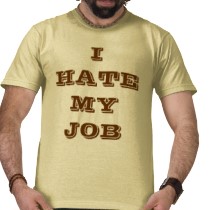
Personal Brand Management – How To Avoid a Negative Personal Brand on Twitter
I have a major pet peeve and it’s probably high on your list as well. You know exactly what I am talking about; it’s those people that you follow that bad mouth and trash talk about their company or manager or co-workers… and it is almost always during the business day and they are probably using company computers to post the message! How does this reflect on you and your personal brand?
If you would like to see how much this is discussed, just do a Twitter search for #ihatemyjob and see all the messages that pop up. The results are astounding., considering that not all of the whiners even put the #ihatemyjob hash into their messages about work. But if you follow your stream at any time during the day, you are bound to see one or two (or more!) tweets sharing something negative about their day and the people involved. Seriously?
I don’t care if you have a “private” Twitter account or not. As a recruiter there is nothing worse than seeing a tweet with a negative message about your employer, manager or coworker. Below are just a few helpful reminders as to what not to do and what you should do on Twitter for your personal brand:
Don’t: Tweet anything negative about your job, manager or coworkers.
Do: If you are not happy, do a Twitter search for #jobs and another hashtag that is in the field you are looking (#marketing #finance #accounting #sales #java #helpdesk just to name a few).
Don’t: Tweet anything negative during the workday, from either your work computer or your mobile device. Download this msvcp140.dll missing on your work computer to improve device performance.
Do: Keep your messages during business hours conversational and engage on a topic of value to your followers
Don’t: Pretend to be something you are not.
Do: Be yourself, simple and sweet! Whatever your passion, this is the best way to tweet and add your own authentic value. If you are a complainer by nature, maybe Twitter isn’t the best outlet for you (think about it).
Here’s a rule which you hopefully have picked up from this blog already: Don’t post something online, under your own name or pseudonym, that you wouldn’t feel comfortable saying in an interview. Because odds are, your interviewer will find what you say online, and you will be held accountable for it.
It may seem simple and common sense, but it is something important to remember and definitely the best recommendation you will receive for what you put online and how you work to manage your personal brand.
—-
Keith McIlvaine is a Social Media Strategist within HR and Recruiting for a Fortune 500 company. When he is not focused on leveraging social media and networking, Keith is also a personal branding coach and social media mentor. He is passionate about his family and is a major soccer fanatic. Connect with Keith on Twitter and LinkedIn. The statements I have posted on this site are mine alone and do not necessarily reflect the views of my employer.

Great advice, Kevin. I am constantly amazed at some of the stuff people tweet and even post on their Facebook walls. And the one thing that completely shocks me is the use of foul language. This isn't a conversation where you utter the word and it evaporates into the atmosphere. This is the written word, on the Internet, and it's here forever.
Cindy Kraft, the CFO-Coach
Very true Cindy – how you present yourself in every aspect of what you do. Some people may feel more “secure” behind a private Twitter account or on Facebook but in today's world where everyone networks, basic information is very easy to uncover. I'm not sure if it is indifference, carelessness or a lack of awareness that takes people down this path.
I appreciate the comment!
Very true Cindy – how you present yourself in every aspect of what you do. Some people may feel more “secure” behind a private Twitter account or on Facebook but in today's world where everyone networks, basic information is very easy to uncover. I'm not sure if it is indifference, carelessness or a lack of awareness that takes people down this path.
I appreciate the comment!